By Jideofor Adibe
In my last week’s column (Beyond the PEPT’s Judgement), I argued, among other things, that the Western brand of liberal democracy we currently practise does not, and cannot work in our type of society where the basis of even statehood remains contested.
This is because the adversarial nature of our electoral competition aggravates the structures of conflicts in the society, deepening the fault lines necessarily mobilised as part of our identity politics and consequently undermining the nation-building process. I equally argued that largely because of these factors, many Nigerians feel alienated from the political process and consequently from the nation-state itself.




















